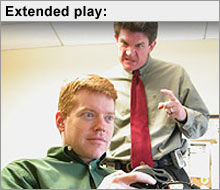
|
|
Want more gaming news and commentary? Click the glazed-eyed gamer.
|
|
|
|
NEW YORK (CNN/Money) – Since Janet Jackson's 2004 Super Bowl half-time peep show, anything on TV and radio that approached, much less pushed, the edge of the envelope has been condemned and ostracized.
Before long, Howard Stern was headed to satellite radio and Dennis Franz was no longer dropping trou on "NYPD Blue."
Having tamed the broadcast media, politicians have turned their attention to the interactive media -- video games, to be precise. Four states (Texas, Georgia, Maryland and North Carolina) and the District of Columbia are currently considering bills that would make it a crime to sell or rent certain video games to children. Michigan, meanwhile, is expected to introduce a bill of its own in the coming weeks. And the governor of Illinois asked legislators earlier this month to pass a similar bill.
The bills vary in their wording, but basically all say the same thing: It should be a criminal offense to sell games featuring nudity or graphic violence to minors. Suggested penalties range upward to a $1,000 fine or six months in jail.
It's an argument that's not without merit. Mature video games receive the "M" rating for a reason – and clearly state on the box that they are not suitable for players under 17.
Then again, so do R-rated movies. But there are no laws that punish theater owners for not enforcing those ratings.
It's not like politicians haven't turned their attention on the video game world before. Washington state, St. Louis County (Missouri) and Indianapolis have each passed ordinances regulating the sale and rental of violent video games. But the courts have stayed or struck down each of those ordinances fairly quickly. So why the rush of legislation now?
Jackson's flash of flesh sparked a cultural uprising that seems to have become a crutch for lazy parenting. Granted, the Super Bowl was a grossly inappropriate venue for such a stunt and there was no way for parents to prevent their children from being exposed (pardon the pun) to it.
But Howard Stern? Racy television shows? Violent or sexy video games? Folks, it doesn't take a rocket scientist to realize what you're getting with these. If your 12-year-old comes home with a game entitled "Grand Theft Auto" or "Playboy: The Mansion," it's a safe bet you're not going to see a lot of cartoon animals onscreen.
It's the parent's job to decide what's appropriate for their children – not the government's. If your kid buys and plays something that seems inappropriate, pop the eject button on the console, put it back in the box, and march your son or daughter back to the store and demand a refund. Should the store absolutely refuse, destroy the game and teach your child an expensive lesson: You don't buy games of this nature without my approval.
Sure, this will result in all sorts of shouting and pouting, but it's not like kids won't act much the same way about many other decisions they feel are unfair.
There's no arguing that any of these bills has its heart in the right place. Young players should not play certain video games. But the ultimate responsibility for ensuring kids aren't exposed to something they shouldn't be starts and ends at home.

|